Mark Anthony Neal's Blog, page 1057
September 23, 2011
A Generation Renewed?
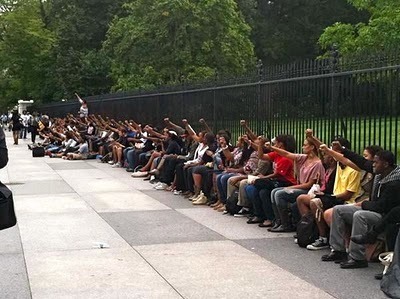
Howard Students Protest Troy Davis Executionby Jeremy Borden and Clarence Williams | The Washington Post
A total of 13 people from Howard University — one a professor and the rest, students — were arrested outside the White House Wednesday while protesting the pending execution of Georgia inmate Troy Davis.
Soon after protesters arrived, police cordoned off the sidewalk area in front of the White House and moved them into Lafayette Square, students and witnesses said. More than a dozen students, along with a Howard English professor, sat along the fence and refused to move, said Marcus Ware, a third-year law student and one of the protest's organizers.
The protesters felt strongly about their right to position themselves against the White House fence, other witnesses said.
Police gave the students and the professor three warnings to move, before arresting them, Ware said.
Twelve people were arrested for failure to obey a lawful police order, and the professor was arrested for crossing a police line, said Sgt. David Schlosser, a U.S. Park Police spokesman.
Protesters were later allowed back in front of the White House.
Several Howard student groups had organized protests over the pending execution of Davis, convicted of killing an off-duty police officer. Davis is scheduled to be executed at 7 p.m., and many around the country and world are weighing in, including religious leaders.
"We weren't being aggressive," Ware said.
Some students and other activists are hoping the White House will intervene. "We fundamentally believe the death penalty is wrong," he said.
Published on September 23, 2011 19:15
African Americans Grow Frustrated with President Obama
Published on September 23, 2011 19:01
The Right's Obama Derangement Syndrome
The Ed Show [MSNBC] hosted by Michael Eric Dyson with Melissa Harris-Perry and James Braxton Peterson.
Published on September 23, 2011 18:49
New Episode of 'Left of Black' Tackles Hip-Hop & Politics
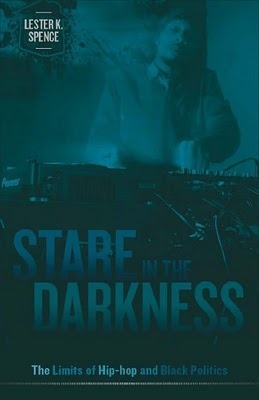
New Episode of 'Left ofBlack' Tackles Hip-Hop and Politics
Onthe next episode of Left of Black,airing on Monday September, 26 at 1:30pmEST, host and Duke University Professor Mark Anthony Neal is joined byLester Spence, Assistant Professor of Political Science at Johns HopkinsUniversity and author of Stare in theDarkness: The Limits of Hip-Hop and Black Politics. Spence discusseswhy people are still apprehensive about hip-hop culture, the role of the "neo-liberalhustler entrepreneur," and grassroots hip-hop organizations. Spence alsotalks about the challenges of studying hip-hop and politics.
LaterNeal is joined by Professor Lawrence P. Jackson, Professor of English andAfrican American Studies at Emory University, author of The Indignant Generation: A Narrative History of African AmericanWriters and Critics, 1934-1960 and RalphEllison: The Emergence of Genius. Jackson considers the periodbetween the Harlem Renaissance and the Black Arts Movement, and addresses thedebates among black authors during this period. Jackson also discussesreaders' initial reaction to Ralph Ellison's Invisible Man and the challenges of publishing scholarlynon-fiction with contemporary trade presses.
Left ofBlack airs at 1:30 p.m. (EST) onMondays on Duke's Ustream channel, ustream.tv/dukeuniversity.Viewers are invited to participate in a Twitter conversation with Neal andfeatured guests while the show airs using hash tags #LeftofBlack or #dukelive.
Left of Black is recorded and produced at the John Hope Franklin Center ofInternational and Interdisciplinary Studies at Duke.
###
Published on September 23, 2011 06:27
September 22, 2011
Troy Echoes
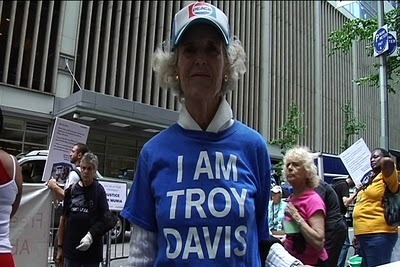 Troy Echoes
Troy Echoesby Jeffrey McCune | special to NewBlackMan
Preface: I hate that the poem I wrote at 7pm is publishable.
Oct 9, 1968
Papa was lynched—
after 7 of 9 recanted:
"He never touched her!"
Yet, the noose tightened—
strangling generations,
reminding all that even breath is not free.
Sept 21, 2011
Ten days after terror,
I hear a man lynched.
The chorus of 7 repeats.
#Dead.
One heart stops,
Voices muted,
People shocked,
Too many ghosts remain.
Helpless.
I sit and hear echoes in my room:
"I am Troy Davis!"
"Too Much Doubt!"
"Power to the People!"
Dead.
***
Does anyone hear the faint cry in the dust?
The soft breath-like whisper,
crying for just…
Is anyone listening?
The innocent screams of young boys and men,
captured by the cyclone of suspicion.
The body drops,
The tears fall,
The free world continues,
while for some it never began.
I swallow…
My God!
My America?
September 21, 2012
Echoes resound.
I listen.
I hear my name.
Loud.
Family Traditions Burn.
***
Jeffrey Q. McCune, Jr. is an Assistant Professor of American Studies and Women's Studies at the University of Maryland-College Park. He is author of the forthcoming manuscript, Sexual Discretion: Black Masculinity and Politics of Passing (University of Chicago Press, forthcoming 2012).
Published on September 22, 2011 09:23
Ben Jealous: "The World Will Remember Troy's Name"
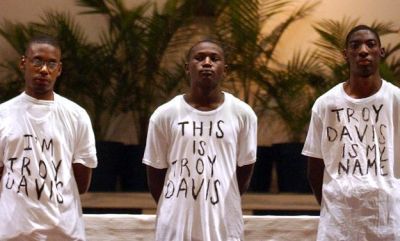 Dear friend,
Dear friend,Tonight the State of Georgia has killed an innocent man.
In recent weeks, we fought hard for the commutation of Troy Davis' sentence. More than one million of your petitions were delivered. Protests, rallies and vigils were organized around the globe. Tonight, we fasted and prayed together as a community.
I have spent the past week with Troy's family. He wanted the world to know that he understood that this struggle goes beyond just one man. Troy was prepared to die tonight. As he said again and again, the state of Georgia only held the power to take his physical body. They could not take his spirit, because he gave his life to God.
Let's remember and heed Troy's words: We must not let them kill our spirit, either.
Troy's execution, the exceptional unfairness of it, will only hasten the end of the death penalty in the United States. The world will remember the name of Troy Anthony Davis. In death he will live on as a symbol of a broken justice system that kills an innocent man while a murderer walks free.
The world will remember Troy's name, as the death penalty supporters who expressed doubt in this case begin to doubt an entire system that can execute a man amidst so many unanswered questions.
The world will remember Troy's name, as death penalty opponents who remained silent in the past realize that their silence is no longer an option.
The world will remember Troy's name because we will commemorate September 21st each year as both a solemn anniversary and a call to action. The night they put Troy Davis to death will become an annual reminder that justice will not be achieved until we end this brutal practice of capital punishment.
"This movement," Troy said, "started before I was born." After tonight, our movement will grow stronger until we succeed in destroying the death penalty in the United States once and for all.
I know you will join me. Together we will secure his legacy, and the world will remember the name Troy Anthony Davis.
In solidarity,
Ben Jealous
Published on September 22, 2011 08:57
September 21, 2011
A Prayer for the Dying
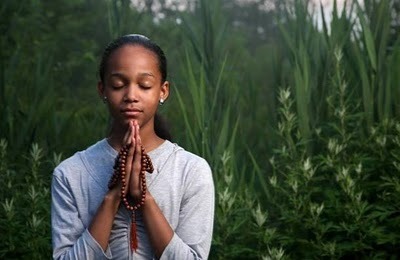
A Prayer for the DyingbyLisa Guerrero | special to NewBlackMan
Onthe day that will eventually see the execution of Troy Davis for a crime he mayor may not have committed, but for which the state of Georgia remains certainhe must die, I find myself trying, unsuccessfully, to go about my dailylife. I do this, not because Idon't think that this miscarriage of justice has nothing to do with me, butrather because I don't think my soul can bear the weight of considering what Iwould do if I know that today would be my last day of life as Troy Davis knowsnow. It does make me feel like acoward to sit and take care of comparatively trivial things like grading,cleaning house, paying bills…preparing for tomorrow, but I am not presentedwith many other options.
Ido find myself stopping periodically throughout September 21, 2011, to considerso many of the ways that as a nation, as citizens of the world, we have lostour ways so mightily. On the sameday as Troy Davis will lose his life I read a story about a schoolsuperintendent in Michigan that is making the audacious and brilliantproposal to have his school turned into a prison so that his students too canbe fed, have access to a good library, a physical education, and theapproximately $23,000 more that are spent per prisoner than per student, all inthe hopes that one day in the near future his students will not becomeprisoners.
Ispend my professional life educating students about the histories and processesof inequality in the hopes that a better understanding on their part will makethe weight of knowing easier to carry on my part. One more person carrying the weight surely will make theburden lighter. Surely. And yet, the weight today is almostmore than I can stand up beneath. But I am not the one who if facing death. That unimaginable task falls to Troy Davis today. But never more has the concept "I amTroy Davis" felt so real to me than it does in this moment. I know that I will die a little tootonight; that my humanity will shrink just a little more knowing that it mustexist in a time and place where justice means blood, but does not bringcomfort.
I,like KevinPowell, do not ignore the tragedy of one death that has begat the tragedyof today's death. The sorrow ofOfficer MacPhail's family, and their desire for justice is, in no way less thanthe sorrow and desire for justice of Troy Davis and his family. But nor is it greater. I cannot even begin to fathom howprofound the desire for justice or revenge or payback or closure must be whensomeone you love is murdered. Butis the desire so strong that it can be satiated by the imperfect execution ofsomeone who may not be responsible for your loved one's death? Perhaps. I cannot know. But what I do know is that whatever cold comfort it brings, it surelydoes not bring justice. I supposethis is why I find myself so burdened today. I'm not sure, even in a nation that promises "Justice forall," that we even know what that is anymore.
Itcertainly cannot be spending ¼ the amount per student in public education as wedo per prisoner in incarceration. It certainly cannot be creating an industry out of incarcerating ourfellow citizens that itself has created a system of "law and order" thatdisproportionately punishes and contains poor people and people of color. It certainly cannot be the"patriotically dressed" justifications for homophobia, xenophobia, racism,sexism, classism, and heterosexism that abound for the seemingly endless streamof violent acts, images, and language that accost women, gays, lesbians,transgender men and women, people of color, poor people, immigrants, andnon-Christians everyday, every minute. It cannot be. Please. It cannot be.
Iknow I will find myself praying tonight. Which might not seem odd, except that it isn't something I normallydo. I don't do it because I don'tknow who to pray to. Though I dobelieve in a power larger than myself, I don't know if that power is God. Because it is hard for me to imaginethat a God who loves us so much could sit so idly by and allow us to do suchhorrible things to one another…and so oftentimes in his name. I just can't believe that's what he hadin mind when giving us free will. But that is my own struggle, one of many, and tonight I will struggle tobelieve. Because tonight I reallyneed to believe that someone is listening to my prayers.
Ipray for Troy Davis and his family. I pray for Officer MacPhail and his family. I pray for myself, my family, my friends. I pray that this is not what justicereally feels like. Indeed, I praythat justice isn't truly so unjust. I pray that we can redeem ourselves before it is too late. I pray that it isn't already toolate. I pray for all of us. All of the dying – those of us who willdie by hate; those of us who die by bullets, knives, beatings, bombs; those whodie by executioner's needles; and those of us who will die by inches anddegrees as we continue to bear witness to the daily injustices, ignorances,violences, and madnesses we commit one to another. May real justice be returned to us someday…and may we allknow peace until that day arrives.
***
Lisa Guerrero is Associate Professor ofComparative Ethnic Studies at Washington State University Pullman, editorof Teaching Race in the 21st Century:College Professors Talk About Their Fears, Risks, and Rewards (PalgraveMacmillan, 2009) and co-author of African Americans in Television,co-authored with David J. Leonard. (Praeger Publishing, 2009).
Published on September 21, 2011 20:19
What I Learned This Summer (or What I Already Knew): The Uncompassionate Conservative Movement

What I Learned This Summer (or What IAlready Knew): The Uncompassionate Conservative MovementbyDavid J. Leonard | NewBlackMan
Kidshave made their way back to school, with many writing and reporting about whatthey did last summer. I thought I would do something similar, writing aboutwhat I have learned about "conservatives" in the last few weeks.
Lesson(1) At a recent Republican Debate, audience members made their support for state-sponsoredexecutions clear. What I learnedis that they think it is a beautiful thing that Texas executes so many people; themere mention of execution resulted in cheers and ovations. They must think that being part of agroup of nations (including China, Iran, North Korea and Yemen) that carriesout a great number of the world's execution is worthy of applause. I guess some find pride in the factthat Texas executed more people in 2010 (17) than Bangladesh and Somalia and asmany as Syria (one less than Libya and about 10 behind Saudi Arabia). While I am appalled by the barbaricpractice of state-sponsored murder, I am equally disgusted by the reaction thatI witnessed that day. I would guessmany of them are unhappy with the U.S. Supreme Court, who issued a stay ofexecution for Duane Buck, who was convicted of double murder in 1985. According to TimMurphy:
In orderto "secure a capital punishment conviction in Texas they needed to prove"future dangerousness"—that is, provide compelling evidence that Buckposed a serious threat to society if he were ever to walk free. They did so inpart with the testimony of a psychologist, Dr. Walter Quijano, who testifiedthat Buck's race (he's African American) made him more likely to commit crimesin the future. (Quijano answered in the affirmative to the question ofwhether "the race factor, [being] black, increasesthe future dangerousness for various complicated reasons.")
GovernorPerry's death penalty record (particularlyquestions raised about his execution of an innocent man) and the applausegiven for executions give me pause. It is yet another reminder of the hypocrisy in the term"compassionate conservative." Lesson(2) The members of the Republican Party think a person without insurance inneed of health care should be left to die because "choices have consequences." DanielleBelton, from The Black Snob, describes the situation in the following way:
The most startling moment was during a hypotheticalquestion posed by Wolf Blitzer abouta 30-something, once healthy uninsured guy who didn't buy insurance when hecould afford it, but got really sick and might die. Should we let him die?While Ron Paul was trying to givehis "go to a church for help if you're uninsured and dying of an illnessanswer" (more on that later), the crowd got a little restless and cheeredfor letting the dude die .
On top ofthe last debate where folks cheered Gov. Rick Perry's death penalty rate in Texas -- even when some of those folkskilled were likely innocent -- has demonstrated a bloodlust among theconservative, "pro-lifer" crowd. Once again proving, the best thingyou can do as a human being with these folks is stay a fetus as long aspossible.
Iguess executions (of some people) are good and allowing some people to die is also fine. These first two"lessons" were just from this month, followed-up on lessons learned throughoutthe summer
Lesson(3) Arizona began implementing a policy that required a $25 dollar fee to visitfamily members within prison. In abill introduced by Rep. John Kavanagh, R-Fountain Hills, the Arizona Departmentof Corrections "impose[d] a $25fee on adults who wish to visit inmates at any of the 15 prison complexes thathouse state prisoners." Arizonaofficials justified the law, which is the first of its kind in the nation, byciting the cost of background checks, even though the collected money will notbe used toward this cost. Insteadthe money will be used to pay for building maintenance and repairs "needed" atits prisons.
Beyondthe inhumanity of a law that seeks to potentially inhibit and restrict familycontact, it is a poor policy if one is invested in shrinking prison population. Numerous studies about recidivism andthe creation of "safe" and "secure" prisons cite family ties as paramount. A recent study from a Massachusettscommission illustrates how such fees are bad policy, (I would add that theyare also immoral, disgusting and illustrative of the lack of compassion and thecommonplace hypocrisy in today's political culture):
Given that "more than half of male inmates were theprimary source of financial support for their children" pre-incarceration3?, fees will notonly impact inmates but also their family members. Inmates that are indigent orhave limited sources of income will often rely on funds transferred from theircanteen accounts for reentry upon their release, including for the purpose ofsecuring housing, access to substance abuse/mental health programming, andeducational opportunities. Funds may also be necessary to regain drivers'licenses for commuting to and from the workplace as well as to pay down thecosts associated with imprisonment. The commission believes that additionalfees would increase the number of inmates qualifying as indigent, increase thefinancial burdens on the inmate and their family, and jeopardize inmates'opportunities for successful reentry.
Lessonslearned: "Conservatives" (at least in Arizona) don't like taxes, but do like totax families who merely want to see their loved ones who happened to beincarcerated. Executions and theuninsured=good; families wanting to see loved ones=bad or at least not worthyenough to avoid taxation.
FutureLesson: House Republicans are currently pushing a bill that will eliminate alldiscretion and autonomy in deportation cases, which according to Mother Jones would result in thedeportation of women like Rebeca Gonzales (pseudonym given in the report). In February, after years of abuse,Gonzalez phone 911 after her boyfriend threatened to prevent her from seeingher 1-year old child. Once thepolice arrived, they (1) demanded that she speak English, (2) disputed heraccusations; and (3) they arrested her. Even though doctors told the police that there was evidence of physicalabuse, they proceeded with the arrest. Ultimately the charges were dropped against Gonzalez, yet the damage wasalready done with ICE notified about her immigration status. AdamSerwer reports that:
Hercalling the authorities for help in finding a safe haven for herself and herchild, Gonzales found herself about to be deported. ICE eventually agreed toclose Gonzales' case after immigration activists turned her story into a symbolof what they see as the Obama administration's draconian immigration policies.Back in Washington, though, Republicans were accusing the administrationof not being draconian enough. In July, Rep. Lamar Smith (R-Texas), thechairman of the House Judiciary Committee, used an ICE memo urging agentsto prioritize the removal of undocumented immigrants with criminal recordsto charge that Obama was instituting "backdoor amnesty."
Unhappywith the Obama administration's partial reversal on its immigration policy, onethat had resulted in the deportation of over 1 million people during hispresidency, the Republicans are seeking to show their compassionate side again. With over 400,000 people deportedyearly, and with roughly 4 million American children living with undocumentedparents (either 1 or both), the deportation process is one that splits upfamilies. DAMorales best summed up this lesson as follows: "What I really respect aboutRepublicans is their devotion to God and Family. Because of God, they have thismoral code that insists Illegal is Illegal, even if slavery or segregation isthe law, the law is sacred and above humanity." He continues to highlight a lesson in their hypocrisy:"Because of their love for Family, and Family Values, they have no problemsplitting up Latino families, deporting the undocumented parents and leavingthe children behind, because that is EXACTLY WWJD, or rather WJWD (what Jesuswould do)."
Sonext time you hear a politician foaming at the mouth regarding family values,remember my lessons from this summer. And these issues certainly transcend party (the Democratic Party hasbeen ineffective and complicit in this country's policies regarding the deathpenalty and deportations), the lessons are not so much about the policy choicesbut the callousness, the lack of respect for humanity, and the visiblecelebration of these injustices. This is what gives me pause. The failure of leaders within the conservative movement to say, "No, wedon't celebrate death, we don't celebrate splitting families apart, we don'tapplaud pain and suffering" has given me pause. I think Danielle Belton best summarized how I am feelingfrom the lessons of the summer in the following way:
Nope,this "let them eat death, poor peoplearen't good enough for cake"attitude is more about: "I have money and I don't want to use it tohelp other people I don't know even if by helping those other people it makesour society a better, healthier and more fair place. I embrace the jungle oflife where, in most cases, I'm already a winner, or, I hold on to the dream thatsomeday I will be the winner and I too can use a small poor child as a footrest after a long day of money counting." This kind of attitude -- a weird perversion of the perfectlyfine Protestant work ethic -- has always been around in American society. Heck,it was pretty much the poor white person's justification for slavery, as maybe,one day, they'd get some darkies to love-and-or-horribly-abuse. What was thepoint in "fairness" if those meant to be beneath you became yourequals?
Andwhile these are not new lessons, evidence in the legislative push to severparental rights for those incarcerated for drug abuse, legislative agendas thathave sought to restrict and limit access to basic welfare, and legislativeefforts to privatize prisons thereby sending incarcerated people to serve theirtime elsewhere, there is something new here. The celebration of and the callous praise for denying life,liberty, and the pursuit of happiness amongst the less-fortunate, amongst thepoor, amongst communities of color, amongst those most vulnerable, feels "new"(renewed). And while I don't longfor a return to a "compassionate conservative movement," I think we would allbe better off if we put a moratorium on clapping for execution, death, anddeportation at least while I wait for end to the death penalty, an end topeople dying because of a lack of affordable and available health care, and endto deportations. Can I get a fewapplause for that???
***
DavidJ. Leonard is Associate Professor in the Department of Critical Culture, Genderand Race Studies at Washington State University, Pullman. He has written onsport, video games, film, and social movements, appearing in both popular andacademic mediums. His work explores the political economy of popular culture, examiningthe interplay between racism, state violence, and popular representationsthrough contextual, textual, and subtextual analysis. He is the author of Screens Fade to Black: Contemporary AfricanAmerican Cinema and the forthcoming AfterArtest: Race and the War on Hoop (SUNY Press). Leonard is a regularcontributor to NewBlackMan andblogs @ No Tsuris.
Published on September 21, 2011 07:25
September 20, 2011
Left of Black S:2 E:2 w/ William "Sandy" Darity and Miriam Duchess Harris
Left of Black S:2 E:2w/ William "Sandy" Darity and Miriam Duchess HarrisSeptember 19, 2011
Left of Black host Mark Anthony Neal is joined by noted economist William "Sandy" Darity , the Arts & Sciences Professor of Public Policy, Professor of African and African-American Studies and Economics at Duke University. Darity discusses the Obama Administration's methods of tackling the economic crisis and reveals his own approach to combating unemployment, via a guaranteed jobs program. Darity then delves into Project Bright Idea, a program that aims to educate youth by providing "gifted-quality education."
Neal also talks with Duchess Harris , associate professor of American studies at Macalester College in Minnesota and author of Black Feminist Politics from Kennedy to Obama . In her book, Harris tours the movements of black feminist women and tells the story of the formation of the National Black Feminists Organization and Combahee River Collective, while highlighting how the face of feminism has changed. Harris also discusses the current controversy surrounding the film The Help.
***
Left of Black is a weekly Webcasthosted by Mark Anthony Neal and produced in collaboration with the John Hope Franklin Center at Duke University.
Episodesof Left of Black are also available for download @ iTunesU
Published on September 20, 2011 19:31
Kevin Powell: "Why Are We Killing Troy Davis"
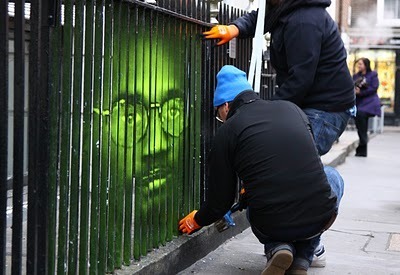 Why Are We Killing Troy Davis?
Why Are We Killing Troy Davis?by Kevin Powell | special to NewBlackMan
"To take a life when a life has been lost is revenge, not justice."-DESMOND TUTU
Unless something God-like and miraculous happens, Troy Davis, 42, is going to be executed tomorrow, Wednesday, September 21, 2011, at 7pm, by lethal injection at a state prison in Jackson, Georgia.
Let me say up front I feel great sorrow for the family of Mark MacPhail, the police officer who was shot and murdered on August 19, 1989. I cannot imagine the profound pain they've shouldered for 22 angst-filled years, hoping, waiting, and praying for some semblance of justice. Officer MacPhail will never come back to life, his wife, his two children, and his mother will never see him again. Under that sort of emotional and spiritual duress, I can imagine why they are convinced Troy Davis is the murderer of their beloved son, husband, and father.
But, likewise, I feel great sorrow for Troy Davis and his family. I don't know if Mr. Davis murdered Officer MacPhail or not. What I do know is that there is no DNA evidence linking him to the crime, that seven of nine witnesses have either recanted or contradicted their original testimonies tying him to the act, and that a gentleman named Sylvester "Redd" Coles is widely believed to be the actual triggerman. But no real case against Mr. Coles has ever been pursued.
So a man is going to be executed, murdered, in fact, under a dark cloud of doubt in a nation, ours, that has come to practice executions as effortlessly as we breath.
Be it Republican presidential candidate Rick Perry, governor of Texas, and the 234 executions that have occurred under his watch (that fact was cheered loudly at a recent Republican debate), or the 152 executions when George W. Bush was governor of that state, we are a nation of an eye for an eye, a tooth for a tooth, a life for a life. Spiraling so far out of control that we are going to execute someone who may actually be innocent tomorrow.
I say we because the blood of Officer MacPhail and Troy Davis will be on the hands of us all. We Americans who fail to use our individual and collective voices to deal with the ugliness in our society that leads to violence in the first place, be they for economic crimes or because some of us have simply been driven mad by the pressures of trying to exist in a world that often marginalizes or rejects us. Thus our solution for many problems often becomes force, or violence. But it has long since been proven that the death penalty or capital punishment is not a deterrent, contrary to some folks' beliefs. Murders continue to happen every single day in America, as commonplace as apple pie, football, and Ford trucks.
I also say we because it is startling to me that Troy Davis could be on death row for twenty years, have his guilt be under tremendous doubt, yet save a few dedicated souls and organizations, there has not been a mass movement of support to save his life, to end the death penalty, not by well-meaning Black folks, not by well-meaning White folks, not by well-meaning folks of any stripe, and certainly not by influential Black folks who represent the corridors of power in places like Atlanta, with the exception of, say, Congressman John Lewis.
You wonder what the outcome of the parole board decision would have been if Black churches in Atlanta and other parts of Georgia, for example, had joined this cause to end the death penalty in America years back, if Black leaders had launched a sustained action much in the way their religious and spiritual foremothers and forefathers had done two generations before?
What could have been different if more Georgia ministers had the courage of Atlanta's Rev. Dr. Raphael Gamaliel Warnock, pastor of the famed Ebenezer Baptist Church once helmed by Dr. King? Dr. Warnock has been steadfast and outspoken, yet seemingly out there alone in his support of Troy Davis. I mean if there is ever a time for Black churches to practice a relevant ministry, as Dr. King once urged, is it not when a seeming injustice like the Troy Davis matter is right in front of our faces? When so many Black males are locked up in America's prisons? What is the point, really, of having a "men's ministry" at your church if it is not addressing one of the major problems of the 21st century, that of the Black male behind bars? Especially in a society, America, that incarcerates more people than any other nation on earth.
And you wonder how the five-person Georgia State Board of Pardons and Parole that, paradoxically, includes two Black males, including the head of the board, must feel. Had it not been for past legal injustices, like the Scottsboro Boys case of the 1930s or the vicious killing of Emmett Till in the 1950s, there would not have been a Civil Rights Movement, nor the placement of Blacks in places to balance the scales of justice, like that Georgia Parole Board. While I certainly do not think any Black person should get a pass just because they are Black, I do think, if you are an aware Black man, somewhere in your psyche has to be some residual memory of Black males being lynched in America, of Black male after Black male being sent to jail, or given the death penalty, under often flimsy charges and evidence. If there is a reasonable doubt, keep the case open until there is ultimate certainty-
Finally, incredibly ironic and tragic that this is happening while our first Black president is sitting in the White House. We, America, like to pat ourselves on the back and say job well done whenever there is a shred of racial or social progress in our fair nation. But then we habitually figure out ways to take one, two, several steps back, with this Troy Davis execution, with the rise of the Tea Party and its thinly-veiled racial paranoia politics, to push America right back to the good old says of segregation, Jim Crow, brute hatred of those who are different, while social inequalities run rampant like rats in the night.
And if you think Troy Davis' cause celebre has nothing to do with Jim Crow, then either you've not been to an American prison lately, or you simply are blind. I've been to many, across our country, and they are filled to the brim with mostly Black and Latino males (and some poor White males), including the majority of folks sitting on death row.
For sure, given my background of poverty, a single mother, an absent father, and violence and great economic despair in my childhood and teen years, but for the grace of God I could be one of those young Black or Latino males languishing in jail at this very moment. I could be, indeed, Troy Davis.
So I cannot simply view the Troy Davis case and execution as solely about the killing of Officer MacPhail. Yes, an injustice was done, a killing occurred, and I pray the truth really comes out one day.
But I am just as concerned about America's soul, of the morality tales we are text-messaging to ourselves, to the world, as we move Troy Davis from his cell one last time, to that room where a needle will blast death into his veins, suck the air from his throat, snatch life from his eyes.
While the family of Mr. Davis and the family of Officer MacPhail converge, one final time, to witness a death in progress-
Now two men will be dead, Officer MacPhail and Troy Davis, linked, forever, by the misfortune of our confusion, stereotypes, finger-pointing, and history of passing judgment without having every shred of the facts. I am Officer MacPhail, I am Troy Davis, and so are you. And you. And you, too.
And as my mother would say, have mercy on us all, Lawd, for we know not what we do-
***
Kevin Powell is an activist and public speaker based in Brooklyn, New York. A nationally acclaimed writer, Kevin is also the author or editor of 10 books. His 11th, Barack Obama, Ronald Reagan, and The Ghost of Dr. King: And Other Blogs and Essays, will be published January 2012. Email him at kevin_powell, or follow him on Twitter @kevin_powell
Published on September 20, 2011 12:59
Mark Anthony Neal's Blog
- Mark Anthony Neal's profile
- 30 followers
Mark Anthony Neal isn't a Goodreads Author
(yet),
but they
do have a blog,
so here are some recent posts imported from
their feed.



